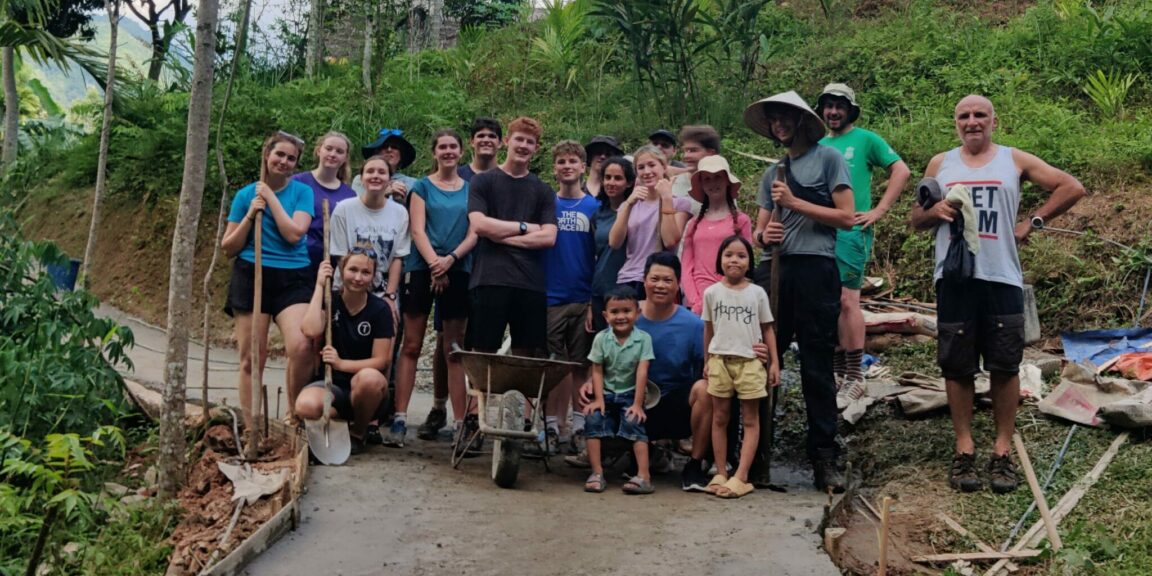
Tormead/RGS Vietnam Expedition 2023
On 11 July, a group of Tormead and RGS Lower Sixth students set out on a 14-hour journey to Hanoi, Vietnam. After hours of sleep deprivation and countless packets of unfamiliar and extravagant Asian meals, courtesy of Singapore Airlines, we finally arrived at our destination. Our first task was simple yet remarkably complicated, trying to find lunch in an unfamiliar city. Our appointed group leader for the day, Dom, who was equally new and unfamiliar with the city, led us continually down narrow streets filled with heaps of precariously balanced items, out of which sellers magically appeared. Eventually we all grew frustrated. Finally, after Izzy yelling at Dom for his legitimate indecision, we took a gamble on an authentic yet fairly deserted restaurant, with a variety of four items on the menu. Safe to say, we learnt our lesson, and in the days to come would pick our restaurants carefully, through deciding not on the food options but on where the locals gathered. But this came to be one comedic fragment of our trip to Vietnam. Throughout our three weeks, Vietnam was no longer just a destination on a map but a series of memories and relationships that we have shaped over the course of our trip. In between visits to Halong Bay on a sizeable boat, sharing spicy pot noodles with our legs dangling from in between each other’s bunk beds on a night train that traversed half of Vietnam, or running up and down the streets of Hanoi to see our favourite smoothie seller, ‘Moo Smoothie’, who would always greet us with a delicious pineapple and mango smoothie, regardless of what we ordered. We hiked for hours in impossible heat, up the narrow sides of hilltops from top to bottom, sharing water and the weight of bags between us.
In the second week, we reached the village in Pu Luong Nature reserve where we begun our project work: namely, paving a local street that ran up and through the surrounding paddy fields. We worked for a week, learning the secrets to measuring, arranging, wheel-barrowing, mixing, and then paving the concrete. Throughout this time we were commanded by our tour guide and leader, Quém, who turned out to know the ins and outs of concrete mixing and application. With a brutal schedule that saw us rise at 5.00am, much to the hilarity of our group leaders for the day who woke us, we paved, sweat-covered and sluggish, through the early hours of the morning. Five hours after waking, at ten o’clock, we had our mid-morning snack break of fresh and sweet banana pancakes, as provided by the chefs of our homestay. We realised, however, too late that the impact of the repaired road was somewhat limited – the leader of the village, one Mr Ming had led us to pave what we believed was a main road, yet was actually the road leading to his driveway. We started work soon on another road used more prominently by the local people. Regardless, our week at the project drew to a close with a night of celebration, provided both by local traditional dancers of a minority Thai population in Vietnam, and then by about fifteen 17-year olds through a medium of improvised karaoke to Frozen’s ‘Let it Go’, and the classic ‘Sweet Caroline’, and an even more improvised dance routine to supplement it.
It’s pretty impossible to summarise our three week trip to Vietnam in any format. Over the course of these three weeks we begun to realise that you can travel as much as you want, but truly discovering things is not in the places you go, but the people you meet. From the friendly women who sold us our first servings of Phó, to the local villagers working alongside us who offered us baguettes and cool drinks throughout the day, or the local children who we lost embarrassingly to in frequent football games. We learnt to connect to the Vietnamese locals through a communication that transcended language or technology. Through the simple acts of working together and mixing concrete, laughing with each other, enjoying traditional dance or even simply hugging or waving. After our Vietnam experience, we would recommend any student or person to travel: to cross the boundaries of their hometown, of their comfort zone and their capacity to connect to others.
Mia & Rina, U6


